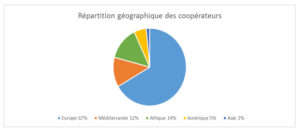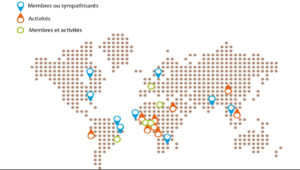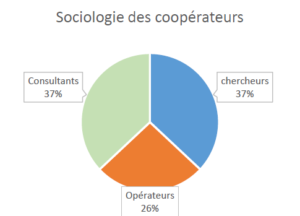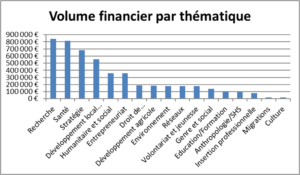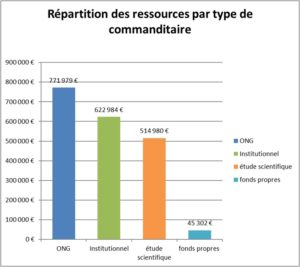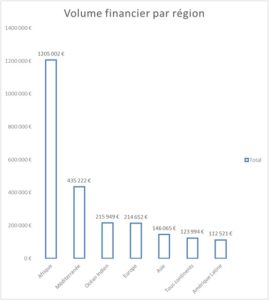Implementation review of the associative project 2012-2018
Network mobilization record from 2012 to 2018
- 148 cumulative memberships (with an average of 50 members with updated contributions each year/circles 1 to 3)
- a college of co-operators of 73 people (paid or volunteers/circle 2)
- a Scientific Comittee of 6 members (circle 1)
- An average of 40 paid cooperative members each year since 2014, including 7 employees (in permanent employment or fixed-term contract) and about 30 persons on fees
- Transversal functions are provided by cooperative members (network running, communication, management) and external service providers (accountant)
- 230 sympathizers listed in our mailing lists (circle 4)
- around a hundred additional contacts (circle 5) and around fifty clients/sponsors (circle 6)
Network’s geography
The Prospective and Cooperation network, perpetually evolving, is located in 33 countries on 4 continents:
- in Europe: France, Belgium, Italy, Spain, Switzerland;
- in the Mediterranean: Morocco, Tunisia, Egypt, Lebanon;
- in Africa: Senegal, Mauritania, Mali, Burkina Faso, Niger, Benin, Togo, Cameroon, Zimbabwe, DRC, Congo Brazzaville, Kenya, Ethiopia, Malawi, Madagascar;
- in America: Brazil, Canada, United States, Haiti, Ecuador, Bolivia;
- in Asia: Cambodia, Vietnam, Nepal.
Geographical distribution of the cooperators
(click images to enlarge)
Geographical distribution of members and activities
Cooperators’ profiles
The network consists of:
- consultants: 37%
- operators: 26%
- researchers: 37%
>> More information about the composition and recruitment of Prospective and Cooperation’s network
Activities carried out over the 2012-2018 period:
-
10 scientific studies in 17 countries in Africa and the Indian Ocean
in connection with research laboratories
-
90 assessments and feasibility studies in Europe, Asia, Africa and Latin America
on behalf of Belgian university cooperation, French and international universities, a local authority, foundations, ministries of health of Burkina Faso and Mongolia and development NGOs.
Thematic distribution of studies and consulting missions
Geographical and per sponsor distribution
>> More information on support advice
>> More information about current studies and research
-
a cycle of meetings between academics and development practitioners
Prospective and Cooperation organizes cycles of meetings between academics and practitioners of development, in the form of workshops-debates.
These aim at initiating a collective reflection in the field of international cooperation and development aid between international, national and local actors (academic researchers, civil society representatives, practitioners of international cooperation and public authorities representatives).
Between 2012 and 2017, two cycles took place:
> 2013-2014 cycle: Mobilization and knowledge transfer in the context of North-South mutations
> 2015-2017 cycle: Professional and scientific practices as a political project
> 2018: Is hell always and still paved with good intentions?
>> More information about the cycle of meetings
-
Initial training of future professionals in development and international cooperation
through teaching in professional Masters from the following universities: IEP Grenoble, Paris 1 Pantheon Sorbonne-IEDES, AMU: Faculty of Law-Institute of International Humanitarian Studies, Faculty of Medicine, Faculty of Litterature, the Institute Public Management and Territorial Governance (IMPGT-AMU), Paul Valery University Montpellier III and the American, University- Center of Provence.
>> More information on initial training
-
13 continuing education services for health and social professionals, international solidarity actors, and researchers and academics in France, Africa and Asia
(As such, we are registered in France as a training organization)
>> More information on continuing education
-
Two development education, citizenship and solidarity projects
in partnership with international development NGOs, popular education associations, academic associations and schools. These projects ended in 2016 and 2017.
In this context, we have in particular supported (skills sponsorship) the creation and implementation of the European Network of Sea Rescue Associations SOS Mediterranée in Germany, France and Italy (www.sosmediterranee.org) in order to provide international humanitarian assistance to shipwrecked people and to promote the rights of refugees in Europe and in the Mediterranean region.
>> More information on development education, citizenship and solidarity projects
Functioning and autonomy of the network
On the basis of these activities, our original economic model relies on self-financing based on commercial services aiming at a wide variety of clients, whose sociology is close to that of our membership and whose diversity ensures the reduction of the risk of dependence, and supplemented by grants (5% of the 2016 budget).
This self-financing makes it possible today to remunerate the co-operators and to finance missions of general interest: education for citizenship and solidarity, sponsorship of skills for humanitarian NGOs (Santé Sud, SOS Méditerranée), innovative research incubator (currently dedicated to the fight against malaria and against cholera), as well as the transversal activities necessary for the proper functioning of the structure:
- Mobilization and animation of the network
- Communication (website)
- Accounting Management and Administration

